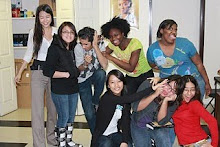
This is an informational interview between Mentor Connection student, Viviana Sanchez and her mentor, Fay Barrett, MPH. Ms. Barrett is in charge of Prevention Education services at the Ryan Center.
Viviana: What is your official title?
Fay: I am the Coordinator for Prevention Education and Outreach Services at the Ryan Center.
Viviana: What were your goals when you were 16?
Fay: I wanted to help people but I didn't know in what capacity when I was in high school.
Viviana: Have the goals stayed the same throughout your life?
Fay: Yes, my goals did stay the same. When I graduated from high school and went to college,
undergraduate major was in social work. I went on to graduate school for a Masters degree in Public Health.
Viviana: Why did you choose to pursue your goals/career? A certain event?
Fay: Well I did internships during my undergraduate college experience. Some of these internships were working as a social work intern and my last internship was working in an HIV unit. This last internship got me interested in HIV and I decided to pursue a job in HIV prevention.
Viviana: What books/movies etc. have influenced your career goals and choices?
Fay: A movie called " And the band played on" influenced my career goals and choices. This movie is about the spread of HIV.
Viviana: What
qualifications, courses, experiences or work did you do before
going to
university?
Fay: I did my internships in the HIV unit during college. I also worked
in a doctor's office and did volunteer work with the
underserved community.
Viviana: What university did you go to?
Fay: I went to
Lehman College for undergraduate and
Hunter College for graduate school.
Viviana: How many years have you been in school after graduating from high school?
Fay: I remained in school about seven years after high school.
Viviana: Was tuition an obstacle? What advice can you give me about this?
Fay: Yes, tuition was an obstacle. I worked to overcome it while going to school. I got scholarships from
TAP and
PELL grants in order to help me with financial aid.
You can start applying to different colleges and see what financial aid they offer. You also need to make sure to keep your grades up. You can also try working for different organizations. For example,
AmeriCorps.
AmeriCorps is an
organization that will give you scholarships towards college tuition.
Viviana: How do you handle obstacles/roadblocks?
Fay: I try to see what obstacles are holding me back. I list the different things I need to do in order to remove the barrier from reaching my goal.
Viviana: Did you have to confront any obstacles on your way to
becoming what you are today?
Fay: I would say yes. Like the challenges of working while going to school. Also the stigma of
working in HIV prevention.
Viviana: What are you strengths and weaknesses?
Fay: My weakness i that I try to do too many things all at once. My strength is the ability to see what is important to tackle first.
Viviana: Who is your hero?
Fay: My mother is my hero because she is a very strong
Caribbean woman.
Viviana: Who do you listen to? Who do you accept advice from?
Fay: I listen to my mother
and my husband. I first listen to what everybody has to say
but I take what is
beneficial for me.
Viviana: Did you have a personal or professional mentor?
Fay: Yes, one of my
supervisors while I was doing my last internship.
Viviana: What overall advice do you have for me in terms of the career I want to pursue?
Fay: You really need to stay focused and enjoy what you are
doing because it
prepares you for the future. You need to ask
for help and guidance as you go along. You also need to ask for
extracurricular activities to do in
biochemistry. Do volunteer work in that area. Find someone who is a biochemist in order to shadow and observe them to see what
type of biochemist you want to
become.

Mentor Informational Interview - Viviana Sanchez
 This week in my placement I continued reading a prenatal book. While reading it, I realized how helpful it will be for my research paper. This book is full of useful information, so useful that I decided to take notes on it while reading. I had a chance to tell Miriam how my essay will be planned and what topics I might include from the book. I found the following topics to be interesting:
This week in my placement I continued reading a prenatal book. While reading it, I realized how helpful it will be for my research paper. This book is full of useful information, so useful that I decided to take notes on it while reading. I had a chance to tell Miriam how my essay will be planned and what topics I might include from the book. I found the following topics to be interesting:



















